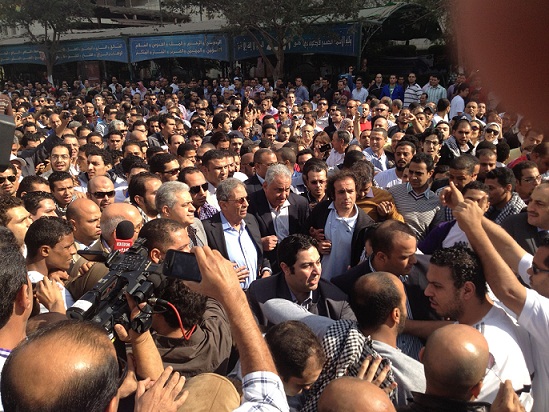JERUSALEM: Of particular note in President Obama s impressive speech to the gathering jointly hosted by Cairo University and Al Azhar, was his use of religion as a language of communication. It was not just a matter of sprinkling his text with quotations from the Quran. Obama reflected a grasp and sensibility that has been woefully lacking in Western politicians who, more often than not, are either ignorant about the religious identity of their Muslim interlocutors, or just plain nervous (and sometimes even hostile) about touching on religion generally.
The issues the President addressed were political, strategic, civic and social.
But as opposed to so many Westerners, he used religious language in addressing these topics. This is not an empty gesture. All too often Western politicians fail to understand that many peoples identities are inextricably bound up with their religious culture, and this is especially the case in the Middle East.
When people are addressed in the language and context of their own cultural identity, they are not only shown genuine respect for that identity but a quality of engagement is facilitated that has a far greater chance of being heard and listened to – even when it contains criticism and challenges that may not in themselves be that easy for the audience to accept.
It appears clear that President Obama understands this profound truth that has eluded most politicians who have sought to overcome tensions and conflicts with the Muslim world. It is especially crucial that this truth become widely understood for a successful resolution of the Arab-Israeli conflict.
This conflict is not in itself religious but territorial. For example, Egyptian President Gamal Abdel Nasser and Israeli Prime Minister Levi Eshkol or his Defence Minister Moshe Dayan, did not go to war in 1967 over theology – they were all atheists! However, the conflict involves peoples with identities that are deeply rooted in religious historical cultures. To try to resolve this conflict without addressing the psychological spiritual dimension is to try to heal deep wounds with band-aids. It has not worked and will not work.
Of course not all those who strove to advance an Israeli-Palestinian peace process were willfully ignorant of the religious dimensions involved. The problem is that all too often they were under the misconception that it is preferable to avoid those dimensions. One can understand this approach, especially when considering the numerous terrible deeds that have been done and continue to be done in the name of religion in our region and beyond. However it is a fallacy to assume that the way to prevent the violent abuse of religion is by ignoring it. The contrary is the case.
By ignoring the religious aspect, a message of disrespect is conveyed; a message that presents the attempt to resolve the conflict as incongruous with if not actually hostile to religion itself. Not surprisingly this just invites hostility from certain quarters where such a political process is perceived as inimical to their interests. This is what happened in the wake of the Oslo accords and it is precisely what has to be avoided if any peace process is to succeed.
Instead of increasing alienation among those with religious commitment, the latter need to be engaged and appealed to in religious terms in order for them to support a process which in fact embodies so many of the most noble teachings of their heritage, precisely as President Obama did in Cairo.
Only an engagement that addresses the religious identities and attachments of the parties involved will have any chance of breaking through the cycle of violence and hostility.
Of all the insights that President Obama has both grasped and articulated as essential for peace and reconciliation, this may well be the most important of them all.
Rabbi David Rosen is international director of inter-religious affairs for the American Jewish Committee and interfaith advisor to the Chief Rabbinate of Israel. This article was written for the Common Ground News Service (CGNews).


